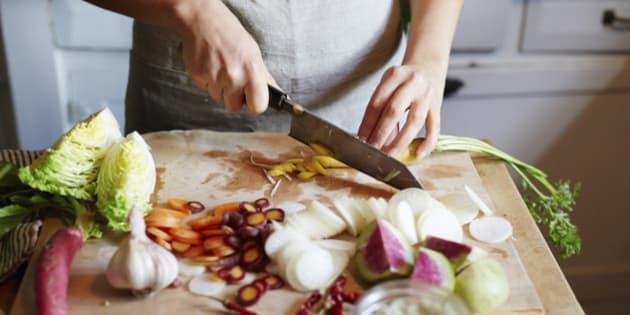The title of this article when it was printed in NY Times Magazines was "Cooking Like a Cynic."
With some frequency these days, you’ll hear talk of cooking “with love” — that supposed secret ingredient, the intangible something extra that makes a chef’s food so good. I am sure that is accurate for some, but I imagine that what is identified as love is probably thoroughness and follow-through and taking the time that work-done-properly takes.
Whenever I hear of "cooking with love," I think of two sitcom situations:
The first was from "Everybody Loves Raymond," when Marie acquiesces and teaches Debra her precious meatball recipe. However, there is a "weird taste" that Debra can't account for, no matter how she tries. Marie had begun the lesson by invoking the "love," and Deb concludes that she must not have it.
She then discovers that the herb jar that Marie gave her was sabotaged. "Love" had nothing to do with it.
The second is from "The Big Bang Theory," the first episode that the excellent Laurie Metcalf guest-stars as Sheldon's mother, Mary Cooper. Penny gushes about her apple cobbler, to which Mary responds, coyly: "You know what the secret ingredient is?"
Penny, simpering: Love?
Mary: Lard.

I think these two examples prove—along with the article—that good cooking has nothing to do with love. It's about being invested enough in the process to learn techniques, follow recipes properly, and occasionally follow one's gut in terms of improvement.
Some people have no interest; their prerogative. Some people rush, make errors, and wonder why their results are politely ignored; again, also their prerogative.
Ma would say that she did not like to cook. However, what she did enjoy was nourishing her family with healthy recipes that they would scarf down even though they had all the fat removed. Nothing gave her greater joy than an empty pot: That meant that whatever she had made was a hit.
I wonder now if I like to cook. I can get excited at the prospect of trying something new, researching recipes, getting it right. There is something rewarding about taking the separate, the raw, and compiling them into a blended, magical creation. Perhaps I do like to cook; the process itself as well as how the results are received (which is not always well. But then I try again).
But what about the Gemarah where Rabbi Yehudah HaNasi tells his non-Jewish guest that his meals have a secret spice called Shabbos?
ReplyDeleteBelieve me, I have eaten many an inedible Shabbos meal. I would say the madreiga of Rabbi Yehudah had more to do with it.
ReplyDelete